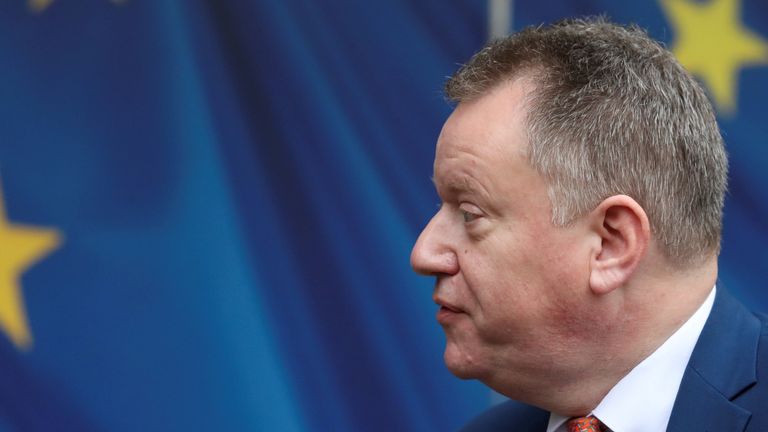US intervenes in UK’s post-Brexit Northern Ireland trade spat with EU
The US has delayed its removal of trade tariffs on UK steel and aluminium products amid concerns at the government’s approach to the dispute with the EU on post-Brexit trade rules affecting Northern Ireland.
The move was met with a defiant response from Whitehall as a spokesperson said it would not “affect the UK’s approach” to the talks with Brussels on changes to the Northern Ireland Protocol – designed to prevent a hard border on the island of Ireland.
Labour described the US move as “unacceptable” while the steel industry urged the British and American governments to “train every sinew” to reach a compromise on the tariffs.
The UK has threatened to trigger Article 16 – an emergency brake that allows the UK or EU to seek to suspend parts of the Brexit agreement that introduced some checks on the movement of goods to Northern Ireland from mainland Britain – if they lead to persistent trade difficulties.
Talks between the EU and Brexit minister Lord Frost are continuing, however European Commission vice-president Maros Sefcovic has expressed frustration this week over a lack of UK compromise.
News of the US intervention came last night when the Financial Times was handed a communication from a US Commerce Department official which suggested that talks with the UK on easing metals tariffs could not move ahead.
The penalties were imposed on the EU by the administration of former president Donald Trump in 2018 and withdrawn by President Biden in October.
But the 25% and 10% tariffs on steel and aluminium imports are set to remain in place for Britain beyond January.
The official, the newspaper said, cited US concerns about British threats to trigger Article 16 especially from the US Congress.
In September, US House of Representatives speaker Nancy Pelosi cautioned that there could be no post-Brexit trade deal with Washington if the Northern Ireland peace agreement was destroyed.
A spokesperson for the Department for International Trade confirmed the US stance by responding: “We do not see any connection with this particular issue and the Northern Ireland Protocol and it will in no way affect the UK’s approach.
“That is because significant changes are needed to the Protocol in order to protect the Belfast (Good Friday) Agreement and Northern Ireland’s place in the UK internal market”.
The government suggested it remained in discussions with US officials regarding the tariffs.
Shadow International Trade Secretary Nick Thomas-Symonds said: “It’s been more than a month since the US agreed to lift punitive tariffs on steel and aluminium exports from the EU, but left the same tariffs in place for the UK.
“Whatever the explanation for that difference in treatment, it is unacceptable for it to continue, and the government must get this situation resolved.
“The UK steel and aluminium industries should not be a pawn in anyone’s political games, when there are jobs and businesses at stake in communities across our country.”
Gareth Stace, director general of industry body UK Steel, said: “On the 1st January, steelmakers in the EU will gain a significant price advantage over their UK counterparts.
“Already, customers in the United States will be factoring in January 2022 prices to their plans for the next year, which of course risks the UK sector losing market share in the US, to EU exporters.
“Since those tariffs came in, our exports to the US have declined from 350,000 tonnes in 2018 to 200,000 tonnes in 2020.
“While many of our US customers have stood by us, it is imperative that all parties work together to come to an agreement that provides the UK with the same tariff free quotas the EU has already secured, and that such an agreement is arrived at as soon as possible.”




